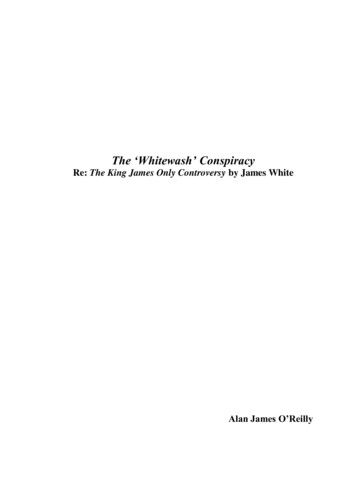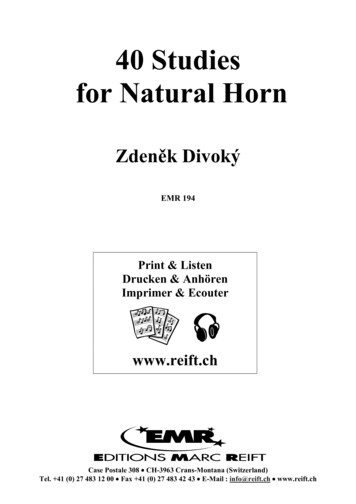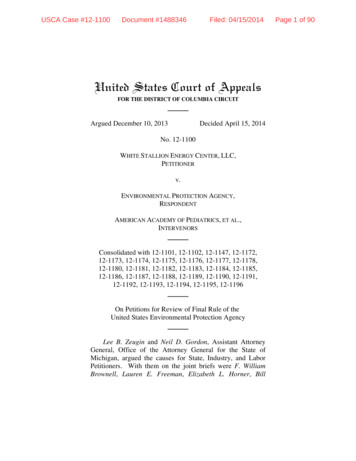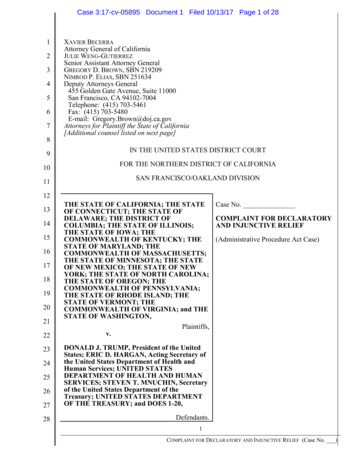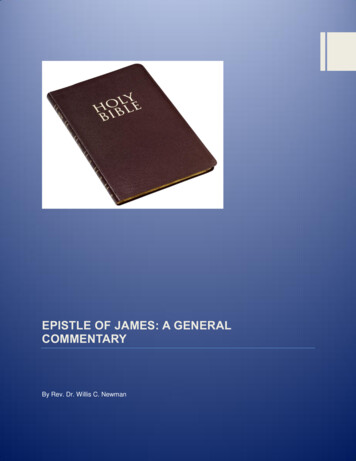
Transcription
EPISTLE OF JAMES: A GENERALCOMMENTARYBy Rev. Dr. Willis C. Newman
EPISTLE OF JAMESA GENERAL COMMENTARYBy Rev. Dr. Willis C. Newman(B.A., M.Ed., M.Div., Ph.D., D.Min.) 2014, Newman Ministries International, Inc.www.Bible-teaching-about.comScripture taken from the New American Standard Bible, 1960, 1962, 1963, 1968, 1971, 1972, 1973, 1975, 1977By the Lockman Foundation. Used by permission.1
INTRODUCTIONThis work is a, introduction, survey and commentary on the Letter by James. My goal is to doan accurate exegesis of the Epistle, but also to relate it to our Christian living. Although there ispractical and theoretical information woven throughout the Epistle, The letter is primarilyfocused on practical Christian living.The primary motivation for this commentary comes from my Liberian pastor friend, Eric Sumo,and my wife Esmeralda (Esmie for short). It is written as a text for a Bible School course forNewman Bible Academy. I appreciate the student’s encouragement.With this introduction, let me tell you a little about Esmie and Me, give a short segment on howto be saved, and then we will jump into the Epistle itself.ABOUT THE AUTHORDr. Willis C. Newman had eight years’ experience in pastoral ministry in Portland, Oregon, USAbefore going into teaching at the Bible College and Seminary Level. At the pastoral level, over900 people prayed to receive Christ as their personal Savior. He is a graduate of the Universityof Portland, Multnomah School of the Bible, Western Conservative Baptist Seminary, CaliforniaGraduate School of Theology and Faith Evangelical Lutheran Seminary. He has taken postgraduate courses in psychology from American Military University.He is Associate Professor at Faith Evangelical College & Seminary, Adjunct AssistantProfessor at a community college, formerly Principal of the Bible College of Tonga and Directorof Polynesian Missions, a missions agency focused on the South Pacific. He served severalyears as the South Pacific Director of Faith Evangelical College & Seminary (formerly FaithEvangelical Lutheran Seminary, Tacoma, WA.). He also served as Professor at InternationalCollege and Graduate School of Theology in Hawaii. While ministering in the Kingdom ofTonga, in 1991 Newman started a teaching site in that country for Faith Evangelical College &Seminary.Newman returned to America in 1998, after serving seven years in Tonga (South Pacific).Since that time, he has been teaching in a community college, where subjects includedpsychology, sociology, and communication. He still teaches Bible and the social sciences atnow Faith Evangelical College and Seminary in Tacoma WA, USA.With his wife, Esmeralda (Esmie), they have started a website featuring free Bible studies, andan online Bible Academy. At this writing, over 30,000 individuals visit the website monthly, andover 1,000 have taken the free online Bible courses. Esmie, who holds a B.A. from theUniversity of Washington, and M.A. from both Faith Seminary and Liberty University, alsoteaches at Faith Evangelical College and Seminary. She conducts international women’sempowerment workshops. Newman has devoted over 30 years in tertiary education.The Newman’s have an extensive ministry in Liberia, Nigeria, Kenya in Africa. The Liberianministry was founded along with Rev. Eric Sumo of Village Ministries. Newman Bible Academyhas teaching sites in the above African countries. They hold regular pastor’s conferences andwomen’s conferences with hundreds attending.2
HOW TO BE SAVEDThe Bible gives us the message (gospel) of how to be saved. By this we mean how to gainforgiveness for our sin and how to gain eternal life. Summarized below are the steps ofsalvation as presented in the Bible. We invite you to receive Christ as Savior.I. Agree in your heart with God that you are a sinner in need of His salvation:"For all have sinned and fall short of the glory of God" (Romans 3:23).2. Know in your heart that there is a penalty to your sin:"For the wages of sin is death" (Romans 6:23a).3. Believe in your heart that Christ died on the cross and rose from the dead to pay the penaltyfor your sins and to give you eternal life:“But God demonstrates His own love toward us, in that while we were yet sinners.Christ died for us" (Romans 5:8) "being justified as a gift by His grace through theredemption which is in Christ Jesus” (Romans 3:24)."For God so loved the world that He gave His only begotten Son, that whoever believesin Him should not perish but have eternal life" (John 3:16)."but the free gift of God is eternal life in Christ Jesus our Lord" (Romans 6:23b).4. By faith pray to God: tell Him you believe the above in your heart and ask Him to save youthrough Jesus Christ. Remember that God is more concerned with the attitude of your heartrather than your exact words."For by grace you have been saved through faith; and that not of yourselves, it is the giftof God; not as a result of works, that no one would boast" (Ephesians 2:8, 9)."if you confess with your mouth Jesus as Lord, and believe in our heart that God raisedHim from the dead, you shall be saved; for with the heart man believes, resulting inrighteousness, and with the mouth he confesses resulting in salvation" (Romans10:9,10)."Behold, I (Jesus) stand at the door (of your heart) and knock; if anyone hears My voiceand opens the door I will come in to him, and will dine with him, and he with Me"(Revelation 3:20)."But as many as received Him (Jesus), to them He gave the right to become children ofGod, even to those who believe in His name, who were born not of blood, nor of the willof the flesh, nor of the will of man, but of God” (John 1:12,13).The following is a suggested prayer:Heavenly Father, I admit to you that I am a sinner in need of your salvation. I believe thatChrist died on the cross and rose from the dead to pay for my sins and to give me eternal life. Ibelieve that only through Christ can I be saved. I ask for and accept by faith your free gift ofsalvation. Please come into my heart and be my Savior and Lord. Thank you for doing so. InJesus' name, amen.Dr. Willis Newman, 2014.Newman Ministries International, Inc.www.Bible-teaching-about.com3
TABLE OF CONTENTSIntroduction . The General Epistles The background of James The context of the Epistle The theme of the Epistle The date of the writing The structure of the book A brief outline of the EpistleCommentary .A. The Nature of Trials (1:1-18). Major teachings Reality of trials Encouragement in trials Pitfalls of trialsB. The Nature of the Word (1:19-27). Hindrances to the Word Application of the WordC. The Condemnation of Partiality (2:1-13). The charge of personal favoritism The costs of favoritismD. The Relationship between Works and Faith (2:14-26) . The controversy The illustrationsE. The Importance of the Tongue (3:1-12) . Control of the tongue Power of the tongue illustratedF. The Nature of True Wisdom (3:13-18) . True wisdom. False wisdomG. The Danger of Worldliness (4:1-17). The source of worldliness The result of worldliness The removal of worldliness The features of godlinessH. The Need for Patience (5:1-12). . The oppression by the rich The patience of the persecutedI. The Power of Prayer (5:13-20) . Prayer defined Issue of sickness Meaning of anointing of oil Confession of sins Example of Prayer Concluding encouragementBibliography .5.88.14.15.17.18.20.21.25.29.324
THE EPISTLE OF JAMES:A COMMENTARYBy Dr. Willis C. Newman 2014 Newman Ministries International, Inc.All rights reservedINTRODUCTIONI. BACKGROUND INFORMATIONA. THE GENERAL EPISTLES.The early church called several books the "General," "Catholic," or "Universal" epistles. The reason isthat with the exception of 2 and 3 John they were not addressed or confined to a single locality. Jamesis one of those General Epistles.B. THE BACKGROUND OF JAMES.James, the author of this epistle was the half-brother of the Lord, the head (Bishop) of the church inJerusalem in the apostolic age. At first unbelieving, he was led to faith in Christ probably by anappearance of the risen Lord. From the first organization of the church at Jerusalem James appears asits head. Paul, for example, reported to James and Peter at Jerusalem (Galatians 1:18, 19). James wasnot an Apostle. He took the leading part in the council at Jerusalem, and was highly respected by thewhole Church (Acts 15:13).The NT mentions three men by the name of James. Two of them were disciples of Christ: James theson of Zebedee and brother of John (Matthew 4:21; 10:2; Mark 1:19; 3:17; Luke 5:10; Acts 1:13). Thesecond James was James the son of Alphaeus (Mathew 10:3; Mark 3:18; Luke 6:15; Acts 1:13). Thethird James was the half-brother of Jesus, and the writer of this epistle bearing his name.Jesus came from a large, close knit family consisting of several brothers and sisters. They were bornafter the birth of Jesus, and were His half siblings. Joseph, Mary’s husband, was a carpenter – andpassed his trade on to Jesus. His mother was named Mary, and his brothers as we know them wereJames, Joseph, Simon, and Judas (i.e. Jude, who wrote the NT epistle). Jesus also had several sisters.After Jesus started His ministry, his brothers doubted that He was the Messiah. It was somewhatshocking to be confronted with one’s brother’s miracles – and also to witness the hostility of the rulersagainst Jesus.After Christ’s resurrection, his brothers and mother were with the little gathering in Jerusalem praying inthe upper room (Acts 1:14). They were convinced of Jesus being the Christ. Jesus also made a specialappearance to James, which probably cemented his absolute loyalty to Christ (Cf. Matthew 1:18;2:11ff.; 13:55-57; Mark 6:3, 4; John 2:1-12; 7:3, 5, 10; Acts 1:14; 12:17; 1 Corinthians 9:5; 15:7;Galatians 1:19).Gradually, James assumed leadership at the Jerusalem Church (Cf. Acts 15:13). He considered hisministry to the Jews (Galatians 2:9). He was loyal to Jewish tradition, but was unwilling to make theMosaic Law normative for all responding by faith to Christ (Cf. Acts 15:14-29; 12:17; 21:18-26).5
James, traditions holds, was known as old, “camel knees” as he spent so much time praying on hisknees. They were thick with callouses. Eventually, James, along with some other Christian companions,was murdered by the Jewish leaders as ordered by the high priest, Ananus. There are two views of theactual death: Josephus claims he was stoned to death. A Christian historian, Hegesippus, is quoted byEusebius as claiming that James was cast down from the temple tower, and then stoned, and finallyhad his skull crushed by a club. The two views can be combined into the one event with each accountgiving more details.According to Josephus, Ananus was a Sadducee who had a severe temper and displayed an insolentcharacter. He took it upon himself to exert his authority and murdered James along with some otherChristians. However, James had such a good reputation, that king Agrippa took the high priesthoodfrom Ananus after only three months in office. The Jews were also greatly offended at the murder ofJames.Some put the date of James’ death at A.D. 63, but others at A.D. 69. The Jews believed that the murderof James initiated the siege to Jerusalem by the Romans and eventuated in the destruction of the city inA.D. 70. The destruction of Jerusalem, Josephus writes, “These miseries befell the Jews by way ofrevenge for James the Just, who was the brother of Jesus that was called Christ, on account that theyhad slain him was a most righteous person.”By the tone of his epistle, James appears as very pious and devoted to Christ. He pulls no puncheswhen calling sin for what it is. He is very direct. However, James was also compassionate and humble,calling himself the servant of Jesus Christ, his half-brother. It was also likely that James had a wife (Cf.1 Corinthians 9:5).C. THE CONTEXT OF THE EPISTLE.The Epistle is addressed to "the twelve tribes which are in the dispersion." These were JewishChristians that lived within and outside of Palestine. It deals with conditions that were generallyprevailing at that time, a time of persecution, poverty, discouragement, temptation and conditionsresulting from them. Those persecuted were impatient and doubting and envious of the rich. PhilipSchaff, in his history of the Christian Church (Vol. 1, p. 270), writes in a footnote, “most Christians werepoor and oppressed by rich Jews.”The believer’s faith was barren. They were discouraged. Hence James writes to them to comfort,encourage, warn, and exhort them. The Epistle is ethical and practical rather than doctrinal. PracticalChristian ethics is the theme.D. THE THEME OF THE EPISTLE.James emphasizes that good works are necessary to show or demonstrate one’s faith. There is aconflict among scholars that James’ emphasis on works is contradictory to Paul’s emphasis on salvationby faith alone. Martin Luther, for example, called the epistle an, “epistle of straw.” The two ideas,however, are not contradictory, but complementary. James does not teach that good works arenecessary to earn salvation – only that if a person is born again, there will naturally be some goodworks as a consequence. For example, an apple tree produces apples. An orange tree producesoranges, not prunes. Likewise, if a person is a born again Christian, there will be evidence somewherein the person’s life.E. THE DATE OF WRITING.The book was written by James A.D. 45-50. Since the Jerusalem council is not mentioned (cf. Acts15:1-35), which was held in A.D. 49, then that suggests the date before A.D. 49. Josephus said thatJames was murdered in A.D. 62 – but others suggest A.D. 69. The destruction of Jerusalem was in A.D.6
70, and it is not mentioned in the epistle. Consequently, we end up with a date of around A.D. 45-50.Some suggest his death was about five years before the murder of Paul.F. THE STRUCTURE OF THE BOOK.1. One of the errors dealt with by James was that of an interest in the mere intellectual perception oftruth and not the practical application of the truth to life and conduct. The doctrine of salvation by faithalone was properly defined and understood by the readers, but it was not vitally applied to personal lifeexperience. Some have called this little epistle the, “Christian book of Proverbs.”2. This principle of true faith producing good works is touched upon in other portions of Scripture (e.g.Ephesians 2:8-10; Titus 2:14), but in James it is emphasized. This theme weaves itself through thebook under the following subjects: The ministry of trials. Wisdom through prayer. Nature of pure religion. Faith justified by works. The life of peace. The control of passions. The grace and value of patience. The power of prayer.3. The principle and value of patience and endurance also runs through the epistle. Endurance comesfrom two words spliced together: “meno,” which means to stay in a given place, state, relation endure,dwell, or remain. The second word is, “hupo,” or under. Hupomeno, then, means to abide under, or tobear up courageously under suffering.Patience comes from “makrothumia”. “Makro” is long, and “thumos” is temper; consequently, it is alsotranslated “longsuffering,” or “long tempered.” Long tempered is to be able to hang on to our temper fora long time in the face of provocation. It is that ability of self-restraint when confronted with aprovocation, aggravation, or the hassles of life, and that does not quickly retaliate, punish, seekrevenge, or try to get even.James teaches us to develop the qualities of patience and endurance in the following situations. Be patience in the face of the various trials of life (1:3). Be patience and persevere in good works by the law of liberty (1:22-25). Be patience and under control under provocation by others (3:1-7). Be patience under oppression and injustice (5:7). Be patience under the suffering of persecution (5:10). Be patience because Christ will make right all the wrongs at His coming (5:8).II. BRIEF OUTLINE OF JAMESA. The Nature of Trials (1:1-18). Major teachings Reality of trials Encouragement in trials Pitfalls of trialsB. The Nature of the Word (1:19-27). Hindrances to the Word Application of the Word7
C. The Condemnation of Partiality (2:1-13). The charge of personal favoritism The costs of favoritismD. The Relationship between Works and Faith (2:14-26). The controversy The illustrationsE. The Importance of the Tongue (3:1-12). Control of the tongue Power of the tongue illustratedF. The Nature of True Wisdom (3:13-18). True wisdom. False wisdomG. The Danger of Worldliness (4:1-17). The source of worldliness The result of worldliness The removal of worldliness The features of godlinessH. The Need for Patience (5:1-12). The oppression by the rich The patience of the persecutedI. The Power of Prayer (5:13-20). Prayer defined Issue of sickness Meaning of anointing of oil Confession of sins Example of Prayer Concluding encouragementCOMMENTARY OF JAMESI. THE NATURE OF TRIALS (1:1-18).A. MAJOR TEACHINGS.In a nutshell, James addresses four issues in this section. How to view trials and the benefits of trials (verses 2-4). We can secure wisdom through prayer (verses 5-8). The riches of this world are very slippery and uncertain (verses 9-11). God is not the source of temptation, nor does he solicit us to evil (verses 12-18).B. THE REALITY OF TRIALS (1:1-8).1. Who wants trials? They are hard, troublesome, messy, and worrisome – and sometimes deadly. Onemistaken view in Christianity is that once we become a Christian, then life will be happy with no8
problems. Then reality sets in. Trouble, turmoil, disease and terrorism bring sadness, suffering, sorrow– and even death and tragedy.Maybe we even think that God is mad at us, and visiting us with punishment. Our faith may sag. Wedon’t like trials. We do everything we can to avoid problems, and even pray that they will go away. Insome quarters suffering is viewed as proof that we are unspiritual, or maybe are harboring secret sin.But, James teaches us a biblical truth that is completely foreign to our thinking. He says we shouldrejoice in trials! Come with me and let’s explore the nature, purpose, and reward of trials.I should first point out that sometimes suffering does come as a form of discipline and correction (e.g.Hebrews 12:4-11; 13:4; 1 Thessalonians 4:6; 1 Timothy 6:9-10). Another issue is that we should notdeliberately plunge ourselves into careless activities that bring suffering and trials. Neither should weturn our back and energies on helping to resolve suffering in the world.Trials are unpleasant, but when we have gone through them, they make us stronger. The writer ofHebrews explains it this way, “All discipline for the moment seems not to be joyful, but sorrowful; yet tothose who have been trained by it, afterwards it yields the peaceful fruit of righteousness (Hebrews12:11).However, once we find ourselves in a trial, we are to respond with the attitude of joy. James states,“Consider it all joy, my brethren, when you encounter various trials” (James 1:2). Look for God in thetrial, knowing that in the end He will be glorified, and it will be to our benefit (Romans 8:28; Ephesians1:11). When we look for God in our problems, and believe He is there, it gives meaning to theimmediate trial, which brings encouragement (2 Corinthians 4:16-18).Several places in the Bible speak of how to view suffering. Probably the most famous place is in thebook of Job. How we view trials, our perspective, and the meaning we place on trials is the key tohandling the fire of trials. Here are some examples.1. Trials are a testing of our faith (James 1:3ff.). The testing does not mean that God permits trials tosee how much faith we have, but it is a mechanism to strengthen our faith. When we come through atrial, we come out stronger. A good example is Hebrews, chapter 11. The heroes of the faithstrengthened their faith through trials. Paul realized the Thessalonians were under persecution andaffliction for their faith. He also indicated that their faith was being “enlarged” in light of their suffering.2. As believers, we should expect trials to come our way (1 Peter 1:6). Life is simply a series of oneproblem after another. Don’t become discouraged when they come. Suffering is part of living, and evenmore so for being a Christian. Jesus said that He was hated by the world, and Christians would also behated (John 15:18, 19; cf. 1 Peter:4:12-19).3. Trials bring endurance, or perseverance (James 1:3, 4; Romans 5:3). We gain staying power. Wedon’t give up, but keep on going as we trust God.4. Trials produce strong character, and improvement on the skills God has given us (Romans 5:4).Think of it as an athlete training for competition. They agonize with pain in preparing their body andmind to win the prize.5. We have the example of the people of God suffering in the Bible. Look at the suffering Paul endured(2 Corinthians 4:8-18). As I look at the events of this world, I wonder why there is so much suffering. AsI write this, the radicals of the Islamic Nation in Iraq murder people with abandon. The Christians are9
killed, raped, and driven from their homes. In West Africa the deadly virus, Ebola, is taking this lives ofhundreds. Since the fall of humanity, there has always been suffering.6. We can know that any form of suffering or temptation we may encounter, others have gone throughthe same thing. God will not let us be destroyed by the temptation, but will see us through theexperience (1 Corinthians 10:13). He will not give us more than we can handle. Sometimes we maystumble and fall, and be buffeted by failure. However, in the end, God will bring us through the storm.7. Satan will bring suffering against us, and God may permit it for a while. However, God has a purposefor it, and will in the end, “perfect, confirm, strengthen and establish you” (1 Peter 5:10; cf. verses 6-11).In this case, we are to humble ourselves before God, know that many others are under the samepressure, and that its purpose is to strengthen our faith. Faith offsets the anxiety we experience.I once knew a couple who were leaders in a large church. He was a professional man, and she was apillar in the woman’s group and missionary endeavors. She suffered a stroke, and became a prisoner toa wheel chair – cut off in the prime of her life. Everywhere they went, the husband had to push her in awheel chair. Why does God let things like that happen? Frankly, I do not know. I cannot know.I think of another illustration. I had a Liberian student once. He was a converted Muslim, became apastor, his church was growing, and he had a marvelous ministry to Muslims. He was in the prime oflife. One day he died and left a young wife and several children. Why would a loving God let that pastordie? Again, I have no idea. This we can know, however, God has a purpose for every situation. Hispurposes always turn out for good in the end.Paul wrote, “And we know that God causes all things to work together for good to those who love God,to those who are called according to His purpose” (Romans 8:28). God always has a purpose foreverything that happens. We can rest our faith and confidence on that fact.8. Suffering for Christ also affirms our identification with Him. Paul wrote that as being children of God,“and if children, heirs also, heirs of God and fellow heirs with Christ, if (since) indeed we suffer with Himin order that we may also be glorified with Him” (Romans 8:17).9. Suffering nudges us toward a more correct attitude toward our life experience. Paul wrote, “For Iconsider that the sufferings of this present time are not worthy to be compared with the glory that is tobe revealed to us” (Romans 8:18; cf. 1 Corinthians 4:16-18).10. Facing and enduring trials with increased faith brings reward. Peter writes, “In this you greatlyrejoice, even though now for a little while, if necessary, you have been distressed by various trials, thatthe proof of you faith, being more precious than gold which is perishable, even though tested by fire,may be found to result in praise and glory and honor at the revelation of Jesus Christ” (1 Peter 1:6, 7).This attitude is based on our salvation experience through Christ, as indicated in the preceding verses.Some think that persecution is in mind here rather than the normal trials of life. In either case, bothapply. The purpose of trials, according to Peter, is to purify our faith, and to prove or demonstrate thereality of our faith – and eventual reward.The word for “proof” (dokimon) means to test for the purpose of approving or judgment. The wordmeans reliable, esteemed, valuable, or genuine. Only authentic believers can meet the testing, and thejudgment is the giving of reward.10
This kind of “proof” teaches us to learn the will of God (cf. Romans 12:2; Ephesians 5:9-10; Philippians1:10). Further, we use it to test ourselves, or check out our own faith in response to stress and trials (2Corinthians 13:5). Finally, we are to “test” the times (Luke 12:56). That is, we learn to interpret and seethe movement of God’s hand and plan throughout history, current events, and especially our own lifeexperience we live out in this world.In other words, when we encounter trials, stress, temptation, tragedy, or suffering in the world or ourown life, our faith directs us to look for the plan and purpose of God in the situation. We look beyond thepresent pain, and look at the eternal plan and purpose of God, and how we are to fit into the mix ofevents. It is similar to the old proverb, “Look for the silver lining in every dark cloud.” The silver lining isGod.James caps off this idea of reward, “Blessed is a man who perseveres under trial; for once he has beenapproved, he will receive the crown of life, which the Lord has promised to those who love Him” (James1:12).11. Suffering produces hope (Romans 5:4). Hope is precious. It has great value. Without it, we give wayto discouragement, sink into despair, wrap ourselves in depression, and sometimes surrender tosuicide. The hope we have is the certainty that we possess something, or that God and His promisesare real, genuine, valid and true. Hope does not disappoint, but brings encouragement, “because thelove of God has been poured out within our hearts through the Holy Spirit who was given to us”(Romans 5:5). This priceless chain reaction leading to hope starts with tribulation (Roman 5:3).12. The killer to faith is doubt (James 6-8). This emphasizes the power of faith. Faith believes that Christhas the ability, motivation, awareness, power, information, and willingness to deliver on His promises,and to act on the principles He sets forth in Scripture. The belief is not necessarily on the promise, buton the Person delivering on His promise.13. God is just. When wrongs are committed against us, He will sort things out and bring the perfectjudgment as He sees fit, and in His timing (1 Thessalonians 1:3-5ff.).14. Suffering also gives occasion for the grace of God to be on display. In chapter two of Ephesians,Paul teaches that we were guilty sinners before God. However, because of His great love, kindness,grace and mercy, He saved the Christian. One purpose was that, “in order that in the ages to come Hemight show the surpassing riches of His grace in kindness toward us in Christ Jesus” (Ephesians 2:7).Grace means to bestow favor upon those who are guilty of sin, and deserve and actually stand underthe Judgment of God. If there were no suffering and affliction in this world, then there would be nobackdrop for God to display His grace.15. There is a catch to suffering. It is not good to suffer when we deserve it. The suffering thatstrengthens faith and brings blessing is when we stand up for Christ and are persecuted. Peter wrote,“By no means let any of you suffer as a murderer, or thief, or evildoer, or a troublesome meddler; but ifanyone suffers as a Christian, let him not feel ashamed, but in that name let him glorify God” (1 Peter4:15, 16; cf. verses 12-19).16. Suffering comes from many sources. Sometimes it is outward circumstances such as persecutionfrom those who hate Christ. Sometimes it is visited upon us by Satan working through circumstances orhis demons and his human followers. At other times, the suffering may come from by various sources:within by sickness or any number of external environmental difficulties and hardships (cf. 2 Corinthians12:7-10; James 1:2).11
17. Suffering, pain, tragedy, and injustice are only for a little while – that is, for the people of God.Comparing the 10-20 thousand years on this earth, eternity is forever. This time of evil will end. Evenon an individual level, our life span is in the 70’s (at least in America), then we will be gone from thesuffering in this world and in the presence of God (Philippians 1:21-24).C. ENCOURAGEMENT IN TRIALS (James 1:9-12).James proceeds to encourage the poor believers who were persecuted by the wealthy people (James1:9-12), or felt inferior to the upper classes because of their low status in life. This encouragement isbrought by reminding the readers where true riches, status, and position come from. He tells thereaders to change their priorities.Many times in this life we get our priorities misplaced. We look to the wealthy with envy and jealousy.We have the saying, “They have it made,” meaning we think they have so much money they are secureand have an easy life.Some sociologists believe that people are all struggling for scarce resource in their culture. There arethree dominate resources that are pursued: power, prestige, and property. Property means wealth.Consequently, the people who have the most power, fame, and wealth are the most successful insociety. They are granted high status, and even are called the “higher or upper class,” as opposed tothe “lower classes.”
second James was James the son of Alphaeus (Mathew 10:3; Mark 3:18; Luke 6:15; Acts 1:13). The third James was the half-brother of Jesus, and the writer of this epistle bearing his name. Jesus came from a large, close knit family consisting of several brothers and sisters. They were b

